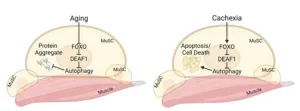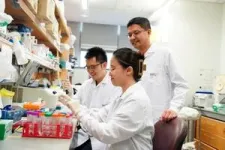With the global population ageing rapidly, sarcopenia, a condition that affects millions of older adults and severely diminishes their quality of life, is emerging as an urgent public health issue. Now, a new discovery by scientists at Duke-NUS Medical School could lead to improved treatments for the condition.
In the study, published in the journal Autophagy, the scientists found that the levels of a certain type of protein, called DEAF1 (Deformed epidermal autoregulatory factor-1), need to be maintained within optimal levels to sustain muscle repair and regeneration—a process that often becomes defective with ageing, or as a consequence of illnesses like cancer. This insight could lead to new treatments for conditions related to muscle degeneration, such as sarcopenia and cachexia.
The study highlighted the role of muscle stem cells, which are important for muscle repair and regeneration. These specialised cells replace muscle tissue that has been damaged or lost after injury or stress. Muscle stem cells become less effective with age, contributing to the muscle loss seen in sarcopenia.
In exploring the role of DEAF1 in muscle stem cell functionality and regeneration, the researchers found that DEAF1 regulates autophagy, a vital process that allows cells to eliminate and recycle damaged components. To maintain muscle health, effective autophagy in muscle stem cells is essential. The study shows that DEAF1 is crucial in managing this process.
Dr Goh Kah Yong, Research Fellow with the Cancer & Stem Cell Biology Programme at Duke-NUS, who is co-first author of this study along with Duke-NUS Integrated Biology and Medicine PhD Programme candidate Ms Lee Wen Xing, explained:
“When DEAF1 levels are either too high or too low, it disrupts this critical clean-up process in our cells. Elevated DEAF1 levels inhibit autophagy, causing damaged proteins to accumulate in muscle stem cells, leading to cell death. On the other hand, insufficient DEAF1 levels result in excess autophagy, impairing muscle cells by disrupting their ability to repair and survive. Maintaining a balanced level of DEAF1 is essential for muscle health and effective regeneration.”
While age diminishes muscle repair and maintenance, decreasing DEAF1 levels might restore balance by boosting the cellular clean-up process, thereby enhancing muscle stem cell survival and ability to create new muscle tissue. This could counteract some of the adverse effects of ageing on muscle tissue, potentially reducing muscle loss and improving overall muscle health. Such a treatment would adjust DEAF1 to beneficial levels for older adults struggling with sarcopenia, a common, age-related disorder characterised by the gradual and progressive loss of muscle mass and strength.
Sarcopenia significantly impacts a person’s ability to carry out everyday activities, reducing mobility and independence. In addition, it heightens susceptibility to falls and fractures and increases overall frailty.
Assistant Professor Tang Hong-Wen from the Cancer and Stem Cell Biology Programme at Duke-NUS, senior author of the study and the first recipient of the Diana Koh Innovative Cancer Research Fund award, noted:
“Both DEAF1 and muscle stem cells are regulated by a group of proteins called FOXOs. In muscle stem cells, FOXOs act as a key upstream regulator of DEAF1 to maintain appropriate levels, which is critical for balancing autophagy.”
However, FOXO activity can decrease as people age, disrupting DEAF1 balance and leading to impaired muscle repair and regeneration. Intriguingly, pre-clinical trials with FOXO activators have been shown to restore the DEAF1 balance and improve muscle regeneration, especially with age.
Managing cachexia-related muscle loss
Strategies aimed at modifying DEAF1 levels could also benefit cancer patients suffering from cachexia, a serious condition characterised by significant muscle wasting. Cachexia differs from sarcopenia in being associated with chronic illnesses like cancer, and involves different underlying mechanisms. Therefore, treatment strategies should address the specific biological pathways associated with each condition.
The study showed that elevated FOXO protein levels in cachexia lead to reduced DEAF1 levels, which in turn stimulate autophagy. However, unlike in sarcopenia, where increased autophagy might aid muscle repair, excess autophagy in cachexia worsens muscle wasting. In cachexia, conversely, increasing DEAF1 levels could potentially slow muscle loss, thereby improving patient outcomes and quality of life.
Despite muscle loss being observed in both sarcopenia and cachexia, the fundamental mechanisms underlying these conditions are entirely different.
Professor Patrick Tan, Senior Vice-Dean for Research at Duke-NUS, remarked:
“Understanding these differences is crucial for developing targeted treatments that specifically address the specific underlying cause of muscle loss in various conditions. As the global population ages and chronic diseases like cancer become more prevalent, these insights will be essential for improving health outcomes and quality of life for those affected by these challenging conditions.”
The researchers are also investigating DEAF1’s role in other tissues in the hope of uncovering new insights that could lead to innovative treatments for other health conditions.
Duke-NUS is a global leader in medical education and a biomedical research powerhouse, combining basic scientific research with translational know-how to bring a better understanding to common diseases and develop new treatment approaches to improve the lives of people in Singapore and beyond.
This research is supported by the National Research Foundation, Singapore under the National Medical Research Council (NMRC) Open Fund - Individual Research Grant (MOH-001208) and administered by the Singapore Ministry of Health through the NMRC Office, MOH Holdings Pte Ltd, and the Singapore Ministry of Education under MOE Tier 1 (2022-MOET1-0004).
END


